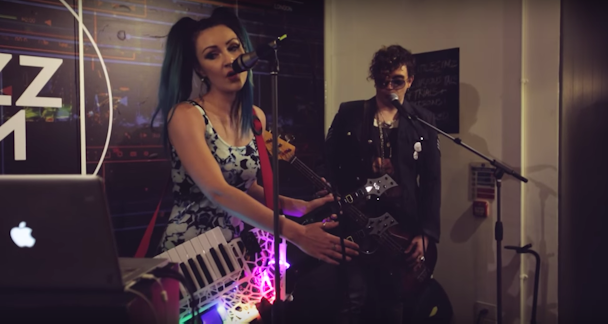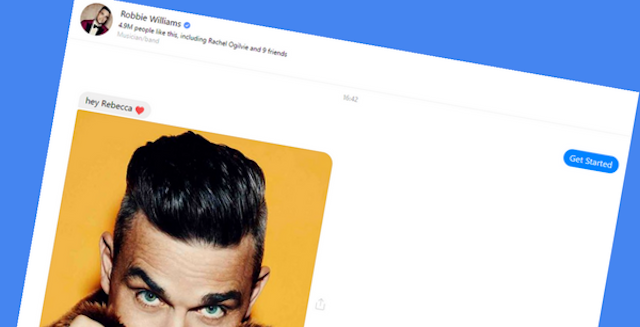Musical hackathons, chatbots and VR gigs: How Sony, Warner and more are fine-tuning innovation
Imagine if by slipping on a virtual reality headset you could learn to play guitar with Mick Jagger, or stand at the side of the stage at Primavera watching Frank Ocean perform to a sold-out crowd. What about helping DJ Hardwell curate the playlist for his radio slot via a bot on Facebook Messenger?

Them&Us perform using the Blade chiptune guitar at the Buzz Jam event - a cross between a 'hack day' and a 'jam session'
This is the future the music industry imagines for itself, and one it has started carving out with the help of startups. For a long time, the sector’s biggest players have been working out how best to use tech to ensure they remain relevant and deliver fan experiences that keep listeners coming back for more, and now their ideas are finally coming to fruition thanks to a healthy dose of openness and innovation.
From VR to chatbots, hackathons to wearables, the music business is finding ways to embrace tech in order to increase connections with existing audiences and market new acts. Over the past few years, it’s fair to say the big boys of music have become more open to dancing to a new tune.
Warner Music UK (WMUK) signalled its intentions to double down on digital innovation in 2016 with the appointment of Emmy Lovell, formerly of Parlaphone and Warner Bros. As vice-president of digital, Lovell is responsible for spotting and developing new tech and heading up the label’s innovation centre, Firepit.
During a recent panel around music and tech at industry event FastForward 17, Lovell said she believes “tech is starting to break artists and artists are starting to break tech”.
While she pointed out it was an exciting time for labels to be on the precipice of developments in the space she admitted it can be a challenge to filter out the good stuff.
"There's so many new technologies and so many opportunities out there we have to be cautious and try and back the right ones because we need to make an impact. We don't want to waste our artists' time on technology that's not going to be successful and so it's about calculating the risk and reward."
When it comes to channels like VR Lovell believes "people will pay if the content is creative and good enough".
"No one could have predicted Spotify was going to be this big 15 years ago, it didn't exist. So, who knows what's going to happen," she continued. "I think being a player in the game is what it's all about and so we'll ride the tide as much as we can just to understand the marketplace if nothing else."
Virtual insanity

VR was a hot topic at the event in Amsterdam, and Lovell pointed out the race to win the hardware battle would be an all important moment for labels, hinting that her money was on Apple’s yet-to-be released headset or Google’s “well-priced,” Play headset.
“We’re watching other industries really carefully to see how they use VR creatively as well. The obvious choice is live, but as you get into being creative with VR it’s what we do to increase that personalised relationship between the artist and fan which is so special, so that’s the area we’re most of excited about at the moment,” she added.
Samsung is one manufacturer that has previously hailed VR as the “future of music.” Last year, it revealed an ad which showed how it envisioned its Gear PR could help music fans relive memories. The spot showed a less than enthusiastic Dad braving throngs of screaming teens at a boy band concert, all the while holding a 360-camera so his sick daughter could slide on a headset and relive the entire show from her room.
So do tech giants like Samsung and Google stand to disrupt the gig experience as we know it? Chief operating officer of British startup MelodyVR, Steven Hancock, who was also on the panel said no, VR “will never replace live” and added that he doesn’t believe a shift towards immersive content spells bad news for those profiting from ticket sales.
Hancock’s company has been dubbed the “iTunes of VR”. At the moment the platform is still closed to the public, but when it goes live later this year year fans will be able to access an on-demand library of 360-degree live streams and recorded performances. It recently inked a deal with WMUK to give audiences access to hundreds of otherwise inaccessible artist experiences like being on-stage at a sold-out concert or in the dressing room before the show.
“In essence, when physical tickets sell out, we can switch to a digital ticket with limitless capacity: so no more four-minute sellouts for Adele’s shows at Wembley, if a million people want to attend that show in real-time, as it’s happening,” he asserted, continuing: “It’s not actually the best seat in the house: it’s actually a completely unobtainable seat in the house: we put you on stage with your favourite artist.”
Human after all

Chatbots are another more experimental medium labels are turning to in order to enhance connections with fans and open up new revenue streams.
Robbie Williams and DJ Hardwell are all proud owners, but far from being just another gimmick the bots are making money for artists in various ways by directing users through to Spotify playlists, merch shops and sending updates about forthcoming tours and releases.
Creative director and head of design at startup The Bot Platform, Rob Hampson, has been running chatbot campaigns for the likes Axwell and Ingrosso and Olly Murs.
Facebook Messenger boasts over a billion users, and Hampson said the tech does offer return on investment, revealing that Axwell and Ingrosso - who are signed to Def Jam Recordings - grossed £10,000 in merch sales in the first few months of having the bot.
Chatbots have already weaved their way into the influencer space with brands like Covergirl using them to bridge the gap between conversation and commerce, and it would appear that the music industry is taking a similar approach but Hampson is clear that users are aware they're not talking to the artist.
During FastForward, talk also turned to Alexa and the role the personal assistant will come to play in fan engagement. Lovell pointed out that Amazon's experimentation in this field with Alexa was natural given the emphasis the company already places on music through Prime, but also said Apple will "blow things out of the park," when it gets it right.
"They’ve got an app store, they’ve got hardware, they’ve got software, and they’ve got so much data to personalise your experience through voice,” she finished.
Come together

The intersection of music and tech is also being propelled by artists themselves –from Imogen Heap's gesture control musical gloves to Will.i.am's Dial smart cuff and Buttons earphones, musicians are seeking out ways to help make fan and listening experiences more enjoyable.
Whereas before artists simply lent their names to tech, they are now fostering its development and working with brands to push their inventions.
Digital music and radio services platform 7digital worked with Will.i.am's tech company, i.am+, to provide music streaming service for Dial which works through voice activation and is offered by telecoms firm Three in the UK.
"It's unbelievable how involved he was in the project, he's really hands on," Emma McIntyre, head of music partnerships at 7digital told The Drum. "He would come to meetings with rightsholders, a lot of people are happy to hand the reins over to us, but he cares about it."
It's not only famous musicians that are being encouraged to hack the industry, however. During his own talk at FastFoward Sam Potts, head of radio promotions at Columbia Records discussed his Buzz Jam initiative which hosts collaborative events that have been dubbed a cross between a hackathon and a jam session.
The project is run in partnership with Sony Music UK and invites coders and artists to come together to create new instruments. At the end of the session, musicians put on a performance using their new creations which Potts said has helped generate a lot of press for emerging talent.
He added that Sony was trying to foster a "culture of innovation" pointing to the label's 'spark fund' which offers funding to startups.
"I think it's really important these days that we give young people, and more junior people at record labels a chance to have their own voice heard because anyone can have a good idea and turn it into a product," he said.
With attitudes like that it is clear labels have big plans to continue fine-tuning their own innovation hubs, as well as expanding how they works with startups to strike the right note with audiences.

